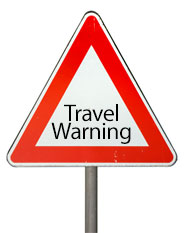5 Tips to Getting a Better Night’s Sleep
September 25th, 2013 by Jennifer Frankel How well you sleep at night can greatly affect how you feel during your waking hours. If you feel sluggish or moody during the day, it could well be because you are not getting a good enough sleep at night. Many times, the secret to improving your sleeping habits can be found in your daily routine. Your sleep schedule, bedtime habits, and day-to-day lifestyle choices can make an enormous difference in the quality of your nightly rest. We’ve compiled a list of ways you can get a better night’s sleep so you can be productive, mentally sharp, emotionally balanced, and full of energy all day long.
How well you sleep at night can greatly affect how you feel during your waking hours. If you feel sluggish or moody during the day, it could well be because you are not getting a good enough sleep at night. Many times, the secret to improving your sleeping habits can be found in your daily routine. Your sleep schedule, bedtime habits, and day-to-day lifestyle choices can make an enormous difference in the quality of your nightly rest. We’ve compiled a list of ways you can get a better night’s sleep so you can be productive, mentally sharp, emotionally balanced, and full of energy all day long.
1. Create a sleep schedule and stick to it.
Go to bed and get up at the same time every day—even on weekends, holidays, and days off. Being consistent reinforces your body’s sleep-wake cycle and helps to promote better sleep at night. However, if you don’t fall asleep within about 15 minutes, get up and do something relaxing. Agonizing over falling asleep can make it even more difficult to sleep.
2. Create a nighttime ritual.
Do the same things every night to tell your body that it’s time to wind down. This might mean taking a hot bath or shower, reading a book, or listening to soothing music with the lights dimmed. Relaxing activities can promote better sleep by easing the transition between wakefulness and drowsiness.
Try not to use a TV or other electronic devices before bed; some research suggests that doing so may interfere with sleep.
3. Avoid daytime naps.
Long naps during the day can interfere with nighttime sleep—particularly if you’re struggling with insomnia or poor sleep quality at night. If you do nap during the day, try to limit yourself to about 10 to 30 minutes and make it during the midafternoon.
4. Include physical activity in your daytime routine.
Regular physical activity can promote better sleep by helping you fall asleep faster and enjoy deeper sleep. Careful, though; if you exercise too close to bedtime, you might find that you’re too energized to fall asleep. If you find that this is an issue for you, try to exercise earlier in the day.
5. Try to manage your stress.
When you have too much to do—and too much to think about—your sleep is likely to suffer. To help yourself get a better night’s sleep, consider healthy ways to manage stress. Start with the basics, such as getting organized, setting priorities, and delegating tasks. Give yourself permission to take breaks when you need them. Before bed, jot down what’s on your mind and set it aside for tomorrow.
Exclusions That Can Bite Your Butt!
September 20th, 2013 by Jennifer Frankel Many international student assume that if they have health insurance, their health care costs are either fully covered or at least a good portion of their medical bills will be paid. Unfortunately, this is not always the case where plans have “exclusions” which tell you what isn’t covered under the health insurance policy. A health insurance exclusion refers to anything that the insurance company will not cover. This can range from anything from a type of drug to a type of surgery. These exclusions vary from plan to plan, so it’s important to read through all of the plan exclusions – as this can be even more important than the benefits listed out in a plan!
Many international student assume that if they have health insurance, their health care costs are either fully covered or at least a good portion of their medical bills will be paid. Unfortunately, this is not always the case where plans have “exclusions” which tell you what isn’t covered under the health insurance policy. A health insurance exclusion refers to anything that the insurance company will not cover. This can range from anything from a type of drug to a type of surgery. These exclusions vary from plan to plan, so it’s important to read through all of the plan exclusions – as this can be even more important than the benefits listed out in a plan!
Common Exclusions
There are a number of exclusions common to health insurance plans. When shopping for an insurance plan, keep an eye out for these exclusions so you know exactly how you are covered.
- Maternity – Make sure that you check the exact working as to what will be covered and excluded when it comes to maternity. In some cases, the delivery is covered but the pre- and post-natal care is excluded. Some plans may only cover complications for maternity within a certain period of time – others will exclude it entirely. Most plans will also exclude maternity coverage if you are already pregnant at the time of purchase.
- Pre-Existing Conditions – A pre-existing condition is any illness or injury that you had before you purchased your plan. If you need coverage for a chronic condition, check to make sure that pre-existing conditions are included. If they are, make sure you are familiar with any waiting period that may apply before these conditions will be covered. If this is not a problem, then you can look for a plan that doesn’t cover this, and in many cases, the plan will be less expensive.
- Sports Coverage – If you will be playing an organized sport for your school, check to make sure that sports are covered, the sport you will be participating in is not excluded and that you understand any exclusions that are listed related to sports. This is one of the more common exclusions.
- Outpatient Prescription Drugs – If you are prescribed medication to help the healing process of your injury or illness, make sure you double check to make sure that that specific drug is covered under your plan.
- Mental Health – Before purchasing a plan, look into the mental health coverage, just in case you need to visit a provider for a mental health disorder in the future. If so, know what is covered and what is not. Keep an eye out for treatments that are often excluded, such as substance abuse.
Your plan may exclude more than what is listed here, so make sure to check and double-check your list, to make sure you are fully prepared in case the unexpected should happen.
Do I Need Dental Insurance?
September 16th, 2013 by Jennifer Frankel As an international student in the US, you know that you need health insurance for the duration of your stay. However, did you know that your health insurance likely doesn’t cover dental health? This doesn’t mean that dental care isn’t expensive; a crown may cost $1,500, and a root canal may cost you between $300 and $1,000. Dentists certainly aren’t cheap, which is why dental insurance may be a good choice for you.
As an international student in the US, you know that you need health insurance for the duration of your stay. However, did you know that your health insurance likely doesn’t cover dental health? This doesn’t mean that dental care isn’t expensive; a crown may cost $1,500, and a root canal may cost you between $300 and $1,000. Dentists certainly aren’t cheap, which is why dental insurance may be a good choice for you.
How Dental Coverage Works
With health insurance, you pay your deductible as well as a significantly smaller portion of the rest of the bill. Dental coverage is exactly the opposite; you receive a certain amount of coverage, and after that you’re on your own to pay the balance of the bill. Once you hit your yearly maximum, you have to either wait until next year for more work or pay the expenses from your own wallet.
The Cost
If you do not have the option of dental insurance through an employer, you will have to pay for your own coverage. This will likely cost between $12 and $50 per person per month. Other plans, while they may not be insurance, allow you to pay a yearly fee that qualifies you for discounted rates at member dentists. These plans generally cost between $75 and $100 per person per year. According to The Wall Street Journal’s MarketWatch, each plan comes out to about the same out-of-pocket costs once all dental bills are paid. As with any product, shopping around for the best rate and terms may be time consuming, but may result in significant cost savings over time.
The Bottom Line
Ultimately, your teeth can get expensive. For this reason, dental insurance might be the best idea for you and your family. Check online for the best rates and call and speak to each of the providers. Ask to see the policy before enrolling and make sure that your dental benefits provider will cover your trips to your dentist.
Want to learn more? Check out our Dental Discount Plans.
Study Abroad Insurance for Spain
September 15th, 2013 by Jennifer Frankel If you are given the opportunity to study in Spain, you have a unique chance to explore and learn about an incredibly interesting and diverse region. With over 46 million people, Spain is home to a variety of regional identities including Baques, Catalans, Galicians, and Castilians. If you are hoping to learn Spanish—or maybe the second most commonly spoken language, Catalan—Spain could be the perfect study abroad location for you.
If you are given the opportunity to study in Spain, you have a unique chance to explore and learn about an incredibly interesting and diverse region. With over 46 million people, Spain is home to a variety of regional identities including Baques, Catalans, Galicians, and Castilians. If you are hoping to learn Spanish—or maybe the second most commonly spoken language, Catalan—Spain could be the perfect study abroad location for you.
Before you depart from your home country, there are a number of considerations that you will need to get in order. Not the least of these considerations is purchasing a study abroad insurance for Spain. You will want insurance that will provide you with coverage even if you spend your weekends making use of the inexpensive public transportation and exploring Europe.
Entrance into Spain can be difficult if you are not properly prepared. You will need to present proof of your travel health insurance showing that it meets the minimum requirements specified by the Spanish government. Most consulates require that you show a minimum of 30,000 euros coverage for medical expenses as well as repatriation benefits. This means that if the worst should happen, and you should die while abroad, your insurance company will pay for your remains to be transported back home.
The Atlas Travel plan is designed to cover your education overseas in Spain, as well as outside of your host country. In addition to meeting the minimum requirements of 30,000 euros with repatriation, the plan will provide you with a customized visa letter immediately, which you can present as proof of coverage and obtain in our Student Zone after purchasing the plan. The plan provides translation services around the clock, and includes coverage for sicknesses such as colds and the flu, as well as major emergencies including hospitalization, emergency room visits, urgent care, and much more.
Step-by-Step Guide: How Do I Submit an Insurance Claim?
September 9th, 2013 by Jennifer FrankelNo matter whether you’ve paid for your charges to your medical bills up front or if the insurance company will pay your doctor or hospital directly, you will need to submit an insurance claim form to the insurance company. This insurance claim form informs the insurance company about the situation, what medical treatment you have sought, and what they need to reimburse you or your provider. To help you along, we’ve compiled step-by-step instructions to help you submit your insurance claim form.
1. Obtain itemized receipts and bills. First, you will need to ask your doctor, clinic or hospital for an itemized bill. An itemized bill lists every service that your doctor provided as well as the cost of each of the services. Your health insurance company will need you to attach the original itemized bills and receipts to the claim form.
2. Get your claim form. Next you will need to obtain a health insurance claim form, which you can do so from the brochure section of our site. Here you will be asked questions such as your insurance information, to whom you want the payment made, what was the visit for (accident/illness), etc. Your claim form will also provide you with additional instructions as to what other information they may need from your doctor or health care facility.
3. Make copies. This is very important. Once you’ve filled out your claim form and have received your itemized bill from your doctor, make copies of everything. This will help avoid any errors that might be made in the claim process and will make it easier for you to re-file your health insurance claim should it get lost.
4. Review then send. Read the claims form again and make sure that you’ve completed all of the necessary fields and attached the necessary receipts and bills. Claims can take approximately 30 business days to process and you may want to contact the number on the back of your card a week after submitting the paperwork to make sure they aren’t missing anything. Once you have everything in order, send out the claim form to your insurance company. The address on where to send the documents are listed on the form. We recommend emailing the claim as this can expedite the process.
Would you like to renew your plan or purchase a different insurance plan?
Top 5 Tips for a Smooth Schengen Visa Application
September 6th, 2013 by Jennifer Frankel Going through the visa application process is always stressful, made worse by the possibility of having your application rejected, which generally leads to panic and anxiety. Some countries are more lax with visa applications, while others are stricter. Other factors in the ease of the application process include what passport you carry and diplomatic relations between countries.
Going through the visa application process is always stressful, made worse by the possibility of having your application rejected, which generally leads to panic and anxiety. Some countries are more lax with visa applications, while others are stricter. Other factors in the ease of the application process include what passport you carry and diplomatic relations between countries.
We have collected some tips to help make your application process as simple and seamless as possible.
1. Do your research.
Most foreign embassies provide information on their websites regarding their Schengen visa application and requirements. You can find everything from application requirements to visa fees, as well as timetables for visa processing. Some countries have specific or different requirements based on your nationality, so make sure you’re aware of these things beforehand. Talking to people who have had experience in applying for the visa you want can be helpful, as well.
2. Make a checklist of requirements.
Some embassies include a checklist of requirements in their Schengen visa application form, which can be extremely helpful in keeping track of which requirements you have and which you need. Not every embassy has this, but it shouldn’t be difficult for you to make your own. This is also helpful when compiling everything for submission.
3. Give yourself enough time.
This will vary depending on where you are as well as where you are going. It’s generally best not to have to worry about deadlines being too close for comfort. Try to give yourself enough time so that if your initial application is rejected, you have enough time to re-apply and get your visa before your scheduled flight. Take note of when the visa of your host country expires, so you can get your next visa and leave before that date.
4. Have a Plan B.
Things don’t always go as planned, so it’s always a good idea to have a back-up plan. If your visa is running out and the country you’re planning on going to next has a long visa turnaround time, go to another country or try to find a way to extend your current visa.
5. Look presentable and act confident on application day.
Some countries require a personal visit for visa processing. Some embassies have a strictly-enforced dress code. Some also conduct an interview as they collect your documents. Try to look your best and make a good impression.
September 2013 Travel Warnings
September 3rd, 2013 by Jennifer Frankel The September 2013 travel warnings are a listing of any warnings that have been posted by the US Department of State in the month of August, warning travelers who plan to visit those countries. Remember to exercise extra care if you are visiting these countries, and check with your travel insurance provider to make sure you still have coverage in place – sometimes coverage can be excluded to countries that are under a travel warning.
The September 2013 travel warnings are a listing of any warnings that have been posted by the US Department of State in the month of August, warning travelers who plan to visit those countries. Remember to exercise extra care if you are visiting these countries, and check with your travel insurance provider to make sure you still have coverage in place – sometimes coverage can be excluded to countries that are under a travel warning.
Countries listed through the month of August 2013 include:
Algeria – August 23, 2013
The Department of State continues to warn US citizens of the risk of traveling to Algeria due to the current security situation and the continuing threat posed by terrorism. The Department of State urges US citizens who travel to Algeria to carefully evaluate the risks posed to their safety. There is a high threat of terrorism and kidnappings in Algeria, and although the major cities are heavily policed, attacks could still potentially take place.
Afghanistan – August 23, 2013
US citizens are warned against travel to Afghanistan, as the security threat to all US citizens in Afghanistan remains critical. No province in Afghanistan should be considered immune from violence, and the potential exists throughout the country for hostile acts, both targeted and random, against US and other Western nationals at this time. There is an ongoing and significant risk of kidnapping and assassination of US citizens and Non-Governmental Organization (NGO) employees throughout the country.
Egypt – August 15, 2013
The Department of State warns US citizens to defer travel to Egypt and US citizens living in Egypt to depart due to the continuing political and social unrest. On August 14, the Government of Egypt declared a State of Emergency that includes a curfew from 7 pm to 6 am in select governates, including Cairo and Alexandria. The US Embassy encourages US citizens who choose to remain in Egypt to comply with local regulations and follow local media for updates regarding your location.
Haiti – August 13, 2013
The Department of State issued a Travel Warning informing US citizens traveling to or living in Haiti about the security situation in Haiti regarding the crime level, lack of adequate infrastructure (particularly in medical facilities), seasonal severe inclement weather, and limited police protection. The Department of State urges US citizens to exercise caution when visiting Haiti. Although hundreds of thousands of US citizens safely visit Haiti each year, the poor state of Haiti’s emergency response network should be considered when planning travel.
El Salvador – August 9, 2013
The Department of State continued to warn US citizens that crime and violence levels in El Salvador remain critically high. Tens of thousands of US citizens safely visit El Salvador each year for study, tourism, business, and volunteer work, but crime and violence are serious problems throughout the country.
Pakistan – August 9, 2013
The Department of State warns US citizens to defer all non-essential travel to Pakistan. On August 8, the Department of State ordered the departure of non-emergency US government personnel from the US Consulate General in Lahore, Pakistan. This is due to the presence of several foreign and indigenous terrorist groups posing a potential threat to US citizens in Pakistan.
Yemen – August 6, 2013
The US Department of State warns US citizens of the high security threat level in Yemen due to terrorist activities and civil unrest. The Department urges US citizens to defer travel to Yemen and those US citizens currently living in Yemen to depart immediately. On August 6, 2013, the Department of State ordered the departure of non-emergency US government personnel from Yemen due to the continued potential for terrorist attack.
While traveling, please keep these August 2013 travel warnings in mind. Travelers are also advised to enroll through the U.S. Department of State’s Smart Traveler Enrollment Program (STEP) to stay up to date on travel security information.
Why Do International Students Need Health Insurance?
August 30th, 2013 by Jennifer Frankel If you are an international student studying in the United States, you may be required to have health insurance coverage for the entire time you are abroad. Even if your visa does not require you to have health insurance, chances are your college or university will. The majority of colleges and universities require international students to provide proof of adequate health insurance coverage before enrollment. So why do international students need health insurance?
If you are an international student studying in the United States, you may be required to have health insurance coverage for the entire time you are abroad. Even if your visa does not require you to have health insurance, chances are your college or university will. The majority of colleges and universities require international students to provide proof of adequate health insurance coverage before enrollment. So why do international students need health insurance?
No National Healthcare
International students need to purchase a health insurance plan since there is very limited government-funded healthcare in the US, most of which is not accessible to international students. The cost for health care in the United States is extremely high and increases annually – so if you do not have an insurance plan, you may be stuck footing the bill. When you have a health insurance plan, this private insurance company will pay toward your eligible costs – leaving you with a much smaller out of pocket bill.
Less Out of Pocket Expenses
Even if you have an insurance plan you should expect to pay something out of pocket, since most plans have deductibles, copays, or coinsurance – but the amount you’ll pay is just a fraction of what you would spend if you didn’t have insurance. Especially in the event of an emergency situation, the costs can add up. A surgical procedure can easily cost hundreds of thousands of dollars, uninsured hospitalization for a single day can cost several thousand dollars, an ambulance or a CT scan can cost around $2,000-$3,000, and an IV injection can cost around $200.
Network Discount Advantage
Sometimes doctors charge up to seven times as much to an uninsured patient as they do for the insured because health insurance companies are able to negotiate drastic discounts for their patients. Health insurance companies pay the majority or even all of the costs, thereby drastically reducing the cost to you, even after paying $200-$4,300 a month in premiums.
For this reason, it is imperative that you have health insurance coverage. Even if you are healthy, you never know when you are going to become seriously ill or injured. If you do need medical care, having a student health insurance in the USA will prevent you from becoming financially crippled by medical bills.
Neosho County Community College International Student Insurance
August 28th, 2013 by Ross Mason Neosho County Community College now has a group health insurance plan for students, check out the Student Zone for information on your health insurance plan.
Neosho County Community College now has a group health insurance plan for students, check out the Student Zone for information on your health insurance plan.
As an international student studying in the United States, it is likely that your college or university requires that you present proof of adequate international student health insurance coverage during your stay in the US. Generally you must present proof of this insurance before you are allowed to enroll in classes. International students at Neosho County Community College are required to have health insurance at the time of enrollment. Although the school does not endorse certain insurance companies, it does provide a list of the minimum insurance requirements that a student’s plan must meet.
Neosho County Community College’s health insurance requirements include:
- Medical benefits of at least $100,000 per accident or illness
- Coverage of at least $10,000 for repatriation of remains
- Coverage of at least $15,000 for medical evacuation
- A deductible per accident or illness not exceeding $500
- Include inpatient and outpatient coverage for sickness and accidents
Alternative Student Insurance
Our Student Health Insurance plan offers four plans that meet Neosho’s health insurance requirements: Smart, Budget, Select and Elite. For an international student aged between 18-24 years old – the cost for one year will be:
- Smart – $345.80 per year
- Budget – $513.24 per year
- Select – $1,066.52 per year
- Elite – $1,961.96 per year
If you would like to learn more about the coverage offered by our plan, please visit our website or contact our customer service team, any member of which will be more than happy to help you and answer any questions you might have. For more information about Neosho County Community College’s health insurance requirements, please visit their school requirements page.
Updated July 2, 2019
How to Make the Most of Your Study Abroad
August 26th, 2013 by Jennifer Frankel Studying abroad is a once in a lifetime experience, and it can be one of the best times of your life. However, if you spend your time locked away in your room, on Facebook, or only socialize with people from your home country, well, you may as well have stayed at home.
Studying abroad is a once in a lifetime experience, and it can be one of the best times of your life. However, if you spend your time locked away in your room, on Facebook, or only socialize with people from your home country, well, you may as well have stayed at home.
The following are some tips on how to make the most of your study abroad experience:
1. Make a list of exactly what you want to get out of your experience.
Whether that’s seeing the sights, experiencing a different style of learning, or something else, figure out exactly what you want to do and make a plan to make sure you do it. You don’t want to come back home and realize that you didn’t do half the things you’d intended to.
2. Branch out.
Culture shock can be hard, but it’s important to reach out and interact with fellow students. It can be tempting to find a group of fellow study abroad students from your home country, but if you only spend time with them, what’s the point of studying abroad? It might be nerve-wracking to approach someone new, but as soon as you say you’re from a different country, people will be falling over themselves to talk to you.
3. Don’t let your grades fall.
Don’t forget: you’re here to study abroad. Have fun, but not so much that you completely ruin your GPA. Try to find the right balance between experiencing your host country and keeping up with your coursework.
4. Try everything.
The point of studying abroad is to experience a new culture, so try to experience everything you can – even the really gross-looking food. Who knows, you may find that it becomes your new favorite.
5. Budget carefully.
You will want to come home with souvenirs and mementos – and you should! But try not to spend all of the money you’ve budgeted for “fun things” in the first month of your stay. Be mindful of how much you’re spending, and how much you can afford to spend.
If you would like to learn more about studying abroad, please visit our study abroad page for more information and advice. If you need further information on healthcare when studying abroad, please do not hesitate to contact one of our insurance experts who will be happy to assist you!
